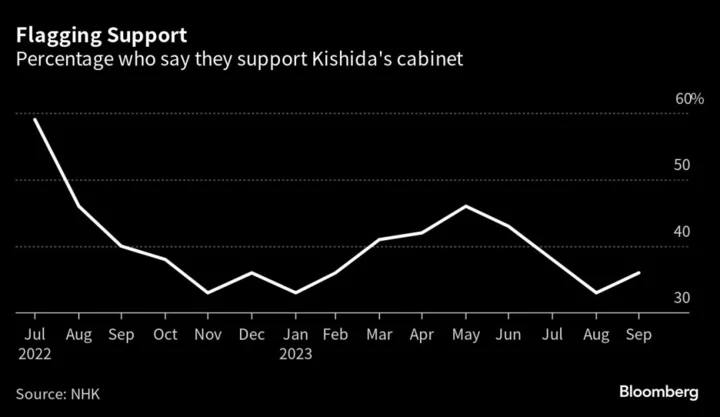Pandemic, war and an assassination have defined Japanese Prime Minister Fumio Kishida’s two years in office, yet his chances of staying in the top job are likely to be determined by more mundane issues such as rising prices.
Since taking office in October 2021, he’s overseen the post-pandemic re-opening and forged an unprecedented response to the war in Ukraine. At home, he faced the fatal shooting of former premier Shinzo Abe, not to mention defying an attempt on his own life.
Now, with polls showing his support close to the lowest levels since he took the reins of the world’s third-largest economy, Kishida must decide on the timing of the next general election. While he’s not obliged to hold a vote until 2025, he could call one in the next few weeks. If he does, the results may decide his fate in a ruling Liberal Democratic Party leadership vote next year.
With polls showing none of the opposition parties boasts more than single-figure support, the long-ruling LDP is almost guaranteed to stay in power, yet it could lose some seats if an election goes badly.
“Surveys show that the biggest cause of dissatisfaction with government policy is that not enough has been done to help with price rises,” the leader of Kishida’s ruling coalition partner party Natsuo Yamaguchi told Bloomberg in an interview last week. “The second is that people want policies on children and families to be backed with funding and put into practice.”
An unassuming former banker, Kishida is already Japan’s third-longest serving premier of the 21st century, behind his former boss, the late Abe, and Junichiro Koizumi. Winning another election would throw off any concern of a return to Japan’s “revolving door” period when six premiers came and went in as many years.
Kishida came to office pledging to spread the fruits of economic growth more widely, combating what he said were the negative side-effects of Abe’s economic policies. While stocks have risen, consumer inflation has been faster than expected, outpacing wage increases and prompting cash-strapped households to cut back on spending.
People working contract jobs, many of whom are employed in the gig economy, have seen incomes rise by nearly 30% in real terms since Kishida took office. But main breadwinners are feeling the strain, with real incomes down 2% during that period, according to the government’s most recent household survey.
More than three quarters of voters said they were dissatisfied with the steps he’s taken to lessen the effects of inflation, according to an Asahi poll, and more than 60% told a JNN poll on Sept 30-Oct 1 they didn’t have positive expectations for an upcoming economic package.
The government’s already extended subsidies on gasoline to the end of the year and more handouts may be coming in the package, which is to be completed by the end of this month and financed with an extra budget. Yamaguchi warned in last week’s interview that such subsidies are intended to help the public with sudden price rises, and may not continue if fuel prices level off.
Kishida’s also considering making an unusual appearance at a labor union convention this month to underscore his support for higher wages. Data on Friday showed inflation slowed last month in Tokyo, a leading indicator for the rest of the country.
What Bloomberg Economics Says...
“Capital investment has been on the rise and corporate earnings have been strong, thanks in part to the tailwind of the weak yen. On the other hand, employment has slowed compared to the Abenomics era, and wage growth is lagging rising living costs. As a result, the recovery in consumer spending from the pandemic remains wobbly.”
— Taro Kimura, economist
Meanwhile, the premier is seeking to head off a fresh run-in with a scandal that tarnished his once clean image, as the man charged with killing Abe is set for pre-trial procedures at a regional court on Oct. 13.
Tetsuya Yamagami said he was motivated by a grudge against a fringe religious group connected to the former premier, blaming it for bankrupting his family by taking excessive donations from his mother.
A party survey found almost half the LDP’s lawmakers had contacts with the South Korean-based group formerly known as the Unification Church, which has a long series of court judgments against it in Japan over its fundraising methods.
Kishida, whose steps to cut his party’s links to the group have been seen as inadequate, is set to try to draw a line under the scandal by asking a court to order the dissolution of the church as soon as Oct. 12, NHK and other media reported on Saturday. While polls show that move is backed by a majority of the public, it may not be enough to restore Kishida’s ratings.
“In the end it’s down to the economy,” said Tsuneo Watanabe, a senior fellow at the Sasakawa Peace Foundation think tank, adding he expected the premier to “wait and see” for a while before calling an election.
--With assistance from Brian Fowler and Kevin Dharmawan.

